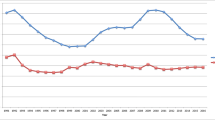Abstract
This paper explores Taiwan’s power reconfiguration resulted from the 2000 presidential election and its implication for the perplexed cross-Strait Strait relations. It looks back at Taiwan’s party transformations on the part of the Kuomintang (KMT) and the Democratic Progressive Party (DPP) over the past decade, discusses several important factors directly related to the victory of the DPP, and analyzes Taipei’s post-election political arrangements and conciliatory gestures toward Beijing. The paper concludes that given the political disparity between mainland China and Taiwan as well as the transitory nature of Taipei’s new government, Beijing will continue its “wait and see” policy toward Taipei, hence the chance for political dialogue between the two sides is slim in the foreseeable future.
Similar content being viewed by others
References
Chan, Bi-hsia (1999)maipiao changhui lu 〈Repentance for Buying Votes〉. Taipei: Business Weekly Publishing Co., ltd.
Chiou, I-jen (1999) “Cross-Strait Relations and the Prisoner’s Dilemma,” paper presented at CSIS seminar on “Cross-Strait Relations and the United States at the Turn of the Century. Washington, DC.
Hsiao, Chuancheng (1996) “Political Democratization and Taiwan’s Foreign Policy” (in Chinese), in Chen Wen-chun, ed.,Political Democratization in Taiwan. Kaohsiung: Graduate Institute of Political Science, National Sun Yat-sen University.
Kau, Tien-sheng (1998)Taiwan chengchi ta yuyan 〈Taiwan’s Political Forecast〉. Taipei, Yuetan Press.
Kuo, Julian (1998)Minchintang de chuanghsing chitung 〈The Painfulness of DPP’s Transformation〉. Taipei: Commonwealth Publishing Co., Ltd.
Lawrence, Susan V. (June 1, 2000) “Breathing Space,”Far Eastern Economic Review.
Li, Jiaquan (1997)Lee Teng-hui zhuzheng Taiwan zhihou 〈Taiwan under the Lee Teng-hui Administration〉. Beijing: Zhongguo Yanshi Chubanshe.
Liu, I-chou (1999) “The Development of the Opposition,” in Tsang, Steve and Hung-mao Tien, eds.Democratization in Taiwan: Implication for China. Hong Kong: Hong Kong University Press.
Pomfret, John (March 19, 2000) “Taiwan Ruling Party Ousted,”Washington Post.
Yang, Kai-huang (1998) “On Lee Teng-hui’s Policy on Cross-Strait Exchanges,” in Chou Yangshan, ed.,Lee Teng-hui chicheng shinian 〈The Lee Teng-hui Administration over the Past Ten Years〉. Taipei: Fengyun Luntan Press.
Author information
Authors and Affiliations
Additional information
He served as President of the Association of Chinese Political Studies from 1998 to 1999. He writes on Chinese politics and cross-Taiwan Strait relations. Most recently, he co-edited Transition toward the Post-Deng China (forthcoming in 2001) and Prospects for Cross-Taiwan Strait Developments (2000). He received a Ph.D. in political science from Pennsylvania State University (1997).
Gang Lin is Program Associate at the Woodrow Wilson Center’s Asia Program. This article reflects the author’s personal viewpoints only.
Rights and permissions
About this article
Cite this article
Lin, G. Taiwan’s power reconfiguration and its impact on cross-strait relations. J OF CHIN POLIT SCI 6, 17–36 (2000). https://doi.org/10.1007/BF02876897
Issue Date:
DOI: https://doi.org/10.1007/BF02876897




